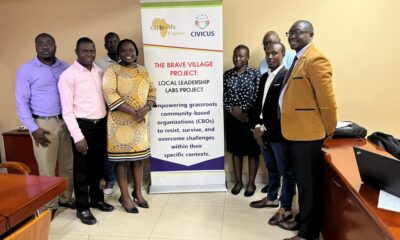News
New Epidemic is Here!
 It kills silently, high blood pressure, diabetes and chronic respiratory diseases, but these diseases are taking the lives of Ugandans at a scary pace.
It kills silently, high blood pressure, diabetes and chronic respiratory diseases, but these diseases are taking the lives of Ugandans at a scary pace.
Just take a look at the recent deaths of high-profile government officials; all three high-ranking justices that have died in the last two years; ie. Amos Twinomujuni – formerly a justice of the Supreme court, Constance Kategaya Byamugisha – formerly the Acting Deputy Chief Justice, and Joseph Mulenga – who died in Aug 2012 shortly after retiring from the judiciary, have all perished due to the scourge of cancer.
The judiciary aside, the political arena has seen shocking deaths arising from high-blood pressure, cancer and cousin diseases; Former 1st Prime Minister Eriya Kategaya died after a short illness due to Thrombosis, an NCD-related condition characterised with difficulty in blood flow. Kategaya was followed to the grave by his ex-colleague Dr. Stephen Malinga who collapsed at his home due to a heart attack, doctors said.
Three Members of Parliament have also died in recent years because of NCDs and they include former Buhweju Woman MP Arinaitwe Kariisa – who died at a tender age of 27 from a brain tumor, Ex-Bukanga MP Gregory Matovu – died from Cancer, while Oromait Michael also died from a heart attack.
Two senior army officers; Brig Albert Kareeba, who was Aide de camp of Queen Elizabeth during her visit for CHOGM and Brig Patrick Kankiriho have also died from Cancer.
While cancer, heart attacks and chronic respiratory diseases are commonly known to be diseases of the rich and the old, new findings from the Ministry of health and the World Health Organisation reveals that the same diseases are claiming the lives of even younger and many poor people.
A study carried out in 2010 about obesity in urban and rural secondary schools in Kampala and Kamuli, found that the rural district of Kamuli had 10.6% overweight students compared to 10.2% in Kampala.
“These are not diseases of the rich. We are on the verge of a catastrophe,” adds Zakumumpa. Indeed when you look at your very family, you will realise that a mother, father, aunt or someone you love is battling one or two of the four major NCDs.
If not urgently addressed, experts are warning that NCDs will drain the little incomes of poor families, let alone undermining the economic development of the country
“It is a silent epidemic. And worse still, very few people are aware of the scale of the problem,”says Henry Zakumumpa, a Communications Specialist with the Uganda National Tobacco Control Association.
Research from the WHO shows that NCDs will overtake communicable diseases like Malaria, HIV/AIDS and Tuberculosis as the leading cause of death in Low and Medium Income Countries like Uganda in just 15 years to come. The recent World Bank report on NCDs in Sub Saharan Africa, also projects that Cancer cases in this region that includes Uganda, will double between now and 2030.
The scale of the problem is made even bigger by the mere fact that most Ugandans do not go for regular health check-ups which leads to late discovery of the diseases thus rendering these health conditions a death sentence.
According to experts, non-communicable diseases, also referred to as lifestyle diseases have become more rampant in Uganda and other poor countries due to increased consumption of inappropriate diets like fried fast foods, sugar and animal proteins, physical inactivity, alcohol consumption and tobacco use.
Lack of awareness among the Ugandan population that is fed by sustained overemphasis on communicable diseases by both the government and donor agencies, adoption of western values and lifestyles and prevailing traditional perceptions that equates someone’s weight with wealth, have further contributed to the increase in NCDs.
According to Primah Kwagala, from the Centre for Health Human Rights and Development (CEHURD), non of the three major policy documents currently followed by the Ministry of Health, is focused on addressing NCDs.
WHO and the Ministry of Health are scheduled to fill the information gap on NCDs with a survey next year to establish the actual burden of the diseases.
High Cost of Treatment
Sadly perhaps, treating these diseases is very expensive and almost out of reach for poor people.
For instance, an ordinary patient spends at between Ushs 20,000 to Ushs 50,000 to buy a weekly doze of insulin from pharmacies and hospitals in Uganda.
Uganda’s drug manufacturers themselves, according to their Chairman Nazeem Mohamed, also CEO of Kampala Pharmaceutical Industry (KPI), are not currently focused on producing drugs for addressing NCDS.
“We have only recently started to invest in producing drugs for NCDs and demand is very high,” said Mohamed. This does not mean they do not have the capacity. “We have the capacity to produce most of these drugs. The good thing is that most of them have gone off patent,” he adds. This means that they can produce similar drugs without fear of infringing on intellectual rights of their inventors.
Mohamed however called upon the government to come up with a clear plan that shows disease priorities to be addressed such that the pharmaceutical industry can invest in producing the necessary drugs.
He added however that as a way of enabling local manufacturers to produce these drugs, the government needs to adopt an economic model that protects them from cheaply produced and imported drugs from India and China.
“If I was able to access the same level of subsidies like free utilities the same way the Indians and Chinese do, I would be able to produce cheaper products,” said Mohamed.
He suggested the Ghana model that has banned the importation of a certain category of drugs that can be produced cheaply within the country.
As Uganda prepares to join the world to mark the World Aids Day December 1, experts are calling for increased awareness among the general population and other forms of investments such as human resource training to address the emerging catastrophe of NCDs before they reverse they reach the level they are in much of the developed world.
Comments



















